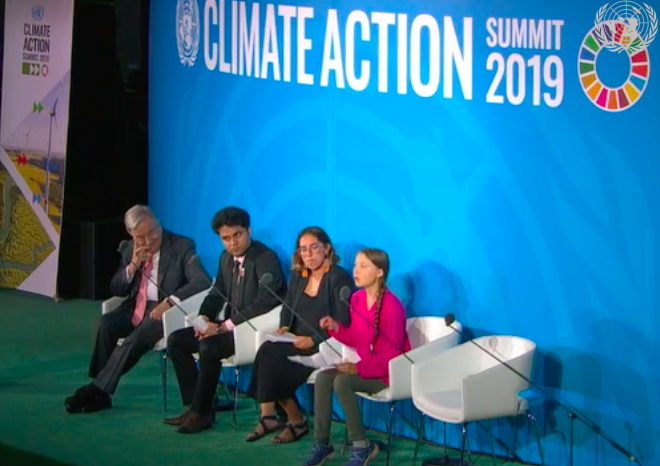Marion Dumas offers examples and outlines steps we can take to create an ecologically-aware society
Climate change is a problem that requires awareness and action by, if not all, at least most, members of society. Unfortunately, it is not a policy problem that we can simply delegate to a group of specialised professionals. An adequate response to climate change requires that we all continuously make informed decisions about our own individual actions, as well as press for change, and search for innovative and wise decisions at a collective level, whether in our lives as professionals, citizens, or consumers.
Why does the burden lie on all shoulders? Because climate change is a doubly pervasive issue. The climate shapes most human activities, and most human activities shape the climate. The practices adopted by many professionals directly influence emissions and are also impacted by climate change. Examples include farming techniques, the design of cities for urban planners, the choice of materials and a host of other parameters in all aspects of construction and infrastructure maintenance. Beyond these obvious examples, climate change awareness is needed in many less obvious situations. Consider the preparedness of hospitals and schools to heatwaves, or one’s awareness that an ageing neighbour may be in distress during a very hot day. The need to wisely mitigate and adapt touches most segments of society.
Given this double pervasiveness of climate change and given the costs, if left to unfold without bounds and adequate preparation to adapt, all higher education (HE) programmes should include climate change in the curriculum. Graduates of such programmes will then irrigate the economy. They will be decision points equipped with tools to anticipate problems and creatively discover solutions. They will feel tasked with the mission to help respond to the problem from whichever position they find themselves in. They will also trust that others they interact with have a similar level of awareness and capacity to cooperate in this effort. Nothing short of this is needed to respond at scale to the climate crisis.
Given this double pervasiveness of climate change and given the costs, all higher education programmes should include climate change in the curriculum
 The UN Climate Action Summit in New York where, for the first time, young activists took the stage to address the issue of climate change*
The UN Climate Action Summit in New York where, for the first time, young activists took the stage to address the issue of climate change*
Some universities and educational systems are showing the way. First, there is a global recognition of the need to reform education, as signaled by the UN-led Higher Education Sustainability Initiative, which seeks to build an alliance of universities committed to sustainability education. More concretely, the University of Gloucestershire, which ranks first in the People and Planet University League, focuses on its “brainprint” by integrating sustainability throughout all its curricula and by developing best practices for the sector as a whole. Along with three other leading universities (Charles University of Prague, Universidad Autonoma de Madrid, and Leuphana University), it led UE4SD, an EU-funded project to develop resources to train university educators to integrate sustainable development in their practice. In the UK, guidance documents and frameworks have been issued for HE educators. At the London School of Economics (LSE), all undergraduates are required to take LSE100 which engages them with big, pressing and wicked problems (one of which is climate change) by developing interdisciplinary strategies to understand complex causes and consequences in an interconnected world. The Finnish National Curriculum 2016, a binding framework for the whole educational system, aims to educate all young people to become sustainable citizens, and emphasises systems thinking, phenomena-based learning (to break down the silos of disciplinary teaching), ethics and civic skills. LSE100 and the Finnish National Curriculum are initiatives in the direction advocated by Lehtonen, Salonen and Cantell. These authors call for a very deep change in our strategies of learning to become truly aware of interconnectedness, emphasising the complementarity between rational thinking, emotional intelligence and different modes of perception.
These developments are encouraging. Yet, at the time being and in most universities, climate change is almost exclusively taught in specialised degrees. At LSE, for example, there are two courses on climate change, one in the Geography department aimed at students on the MSc in Environment and Development and the MSc in Environmental Policy and Regulation, and a law course aimed at law students. Instead of education, universities’ climate and sustainability plans overwhelmingly focus on reducing their operational carbon footprint. Symptomatically, the Times Higher Education Rankings for climate action does not include systematic integration in the curriculum as a criterion. A focus on operations is important, but insufficient, as a satisfactory climate strategy for any organisation that is serious about addressing the climate crisis should be to align its core mission with the collective imperative to mitigate and adapt.
 UBC Reads Sustainability is an interdisciplinary forum for students to discuss sustainability-related issues at the University of British Columbia, the university that topped the Times Higher Education rankings for climate action in 2019*
UBC Reads Sustainability is an interdisciplinary forum for students to discuss sustainability-related issues at the University of British Columbia, the university that topped the Times Higher Education rankings for climate action in 2019*
Many academics already feel overburdened by their many educational, administrative and research commitments. They will argue that they do not have the capacity to integrate a whole new body of scholarship into their teaching, in which they are, moreover, no expert. This is a valid concern, but we can find ways to efficiently develop and diffuse appropriate content and make it easy for instructors to get involved.
First, a Climate 101 course with the foundational content can be developed to suit a wide range of students and then be taught via MOOCs or in large lecture halls. Second, as educators revise their syllabi, they can devote one lecture to the links between their subject and one or several aspects of climate change. Students can also deepen their learning with programme-specific research projects that bring to bear their programme expertise on the problem of climate change. Thus, a student on the Master of Public Administration programme might work on comparing a range of energy transition policies, while a student of Global Public Health might work on how to modify some public health programmes in light of expected shifts in disease exposure risks due to climate change.
The case made for universal education on climate change could and should be expanded to other burning topics of sustainable development. The issue of biodiversity collapse and the plastics crisis are just as pervasive in their causes and effects as climate change. Moving beyond a problem-by-problem approach, we need a universal education about the basic principles of ecology and the ways in which to practice economics and policy so as to respect the life support systems of the earth; otherwise, we will continue to create large systemic problems to which we react too late, instead of becoming an ecologically-aware society that can wisely design and pre-empt such systemic crises.
In practice: from naive to ecologically aware
How education can help students develop their eco IQ
It is true that a handful of “carbon majors” process most of the fossil fuel we each directly or indirectly use and that these “carbon majors” bear a great deal of responsibility due to their resistance to change. Yet, finding substitutes to fossil fuels and ways of reducing the total amount of energy we use is a challenge that must mobilise society as a whole. To mitigate, everyone must understand how their actions contribute to emissions and what they can do, individually and especially as part of a variety of collectives, to drive towards net-zero societies. A naïve reading of economics might make you think that a price on carbon would communicate all the necessary information. This is not true. First, education is needed to understand why there is a price on carbon and to politically support it. Second, a price may create the motivation to act, but not the knowledge. Education is needed to equip people to respond to a hefty price on carbon, as it will require cooperation and involvement by everyone to discover smart ways of reducing emissions as well as monitor and enforce agreements.
_____________________________________________________________________________________________________________________________
This post is opinion-based and does not reflect the views of the London School of Economics and Political Science or any of its constituent departments and divisions.
_____________________________________________________________________________________________________________________________
*Image information
UBC Reads Sustainability is an interdisciplinary forum for students to discuss sustainability-related issues at the University of British Columbia, the university that topped the Times Higher Education rankings for climate action in 2019
The UN Climate Action Summit in New York where, for the first time, young activists took the stage to address the issue of climate change





